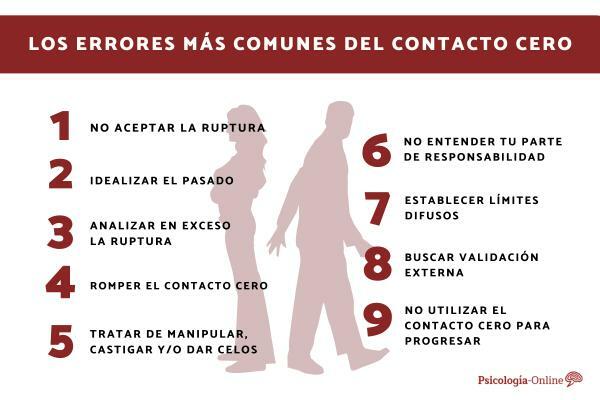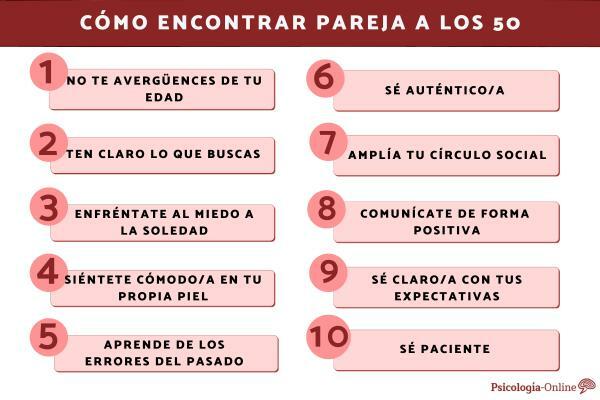
Couple breakups are painful and complex because they involve the loss of an important relationship and a host of complex and even contradictory emotions. When a heart is broken, the person goes through an emotional storm in which they experience simultaneously sensations such as shock, confusion, sadness, fear, anger, anguish, anxiety and devastation. Zero contact is an effective way to manage these emotions and process the breakup. By not communicating with the ex-partner, both parties are given space and time to process what happened and heal the emotional pain after the separation. This no-contact period is an excellent opportunity to improve, reflect on the past, and become more aware of the reasons for breaking up. However, at times it may seem impossible to move on without reaching out to your ex.
In this Psychology-Online article, we explain the most common zero contact errors.
Index
- Don't accept the breakup
- idealize the past
- Overanalyzing the breakup
- break zero contact
- Trying to manipulate, punish and/or make your ex jealous
- Not understanding your share of responsibility
- Set fuzzy boundaries
- External validation search
- Do not use zero contact to progress
- What if we both make zero contact
Don't accept the breakup.
Accepting a breakup can be very difficult because losing someone with whom you shared an intimate connection is very painful. However, not accepting it will hinder recovery, which is the ultimate goal of zero contact. Not accepting the break implies that the person is held in the past and makes it difficult to move forward and recover.
Various studies in the field of psychology1,2 have shown that the absence of contact with a former partner decreases the frequency and intensity of negative thoughts about the breakup. That is, the sadness and attachment that you maintain towards your ex decrease linearly over time. For this reason, one of the fundamental aspects of zero contact is to minimize the psychological presence of the ex-partner in our thoughts and our lives.
Not accepting the reality of the break up fuels intrusive thoughts and prevents coping with the pain of loss, which is necessary for healing. For this reason, It is essential to be willing to let go of the relationship, at least in the moment after the breakup of the couple. Keeping hopes alive and denying the reality of the separation, it is not possible to move forward, only to go backwards.
Idealize the past.
After a breakup, it is common to idealize the relationship and remember only the good times, forgetting or minimizing problems and disagreements. This is a natural human tendency, since after the separation of a significant person there is a great sense of loss and emotional emptiness and idealizing the relationship can help fill that void temporarily.
However, when idealizing we can make the mistake of forgetting and ignoring those aspects that precipitated the break, such as the discussions constants, the feelings of loneliness, the times that our partner acted with disdain, the risque tone and the pejorative adjectives. Not having contact with your ex allows you to see the separation in a more realistic way and not like the end of the world.
Without sweating, it will be easier to overcome the relationship by remembering everything for which it broke up, than from the idealized belief of having lost the "perfect" relationship.

Overanalyzing the breakup.
Having a clear understanding of why the relationship ended is very important to our ability to move on. However, on some occasions when we are offered a simple and honest explanation, we reject it. The emotional pain after a love breakup is so dramatic that our mind makes us believe that the cause must be just as dramatic. This instinct can be so powerful that it can lead even the most reasonable and measured people to seek hyperbolic explanations and conspiracy theories where none exist.
One of the hardest things about a breakup is wondering if it could have been different or could have been prevented. The "what ifs" keep us anxious and make us feel guilty. For example, we question whether we made the right decision or whether we could have done more. All these thoughts keep us stuck in the past and cause us to fall into a cycle of negative thinking and rumination.
The reality is that there is no explanation for the breakup that is going to be completely satisfying or that will make the pain go away. Rationality or logic cannot erase emotional pain. You should avoid contacting your ex to ask for more explanations about your separation and accept reality to move on.
Break zero contact.
Relationship breakup can be compared to drug withdrawal in some ways because of the way our brain processes and reacts to the loss of a significant relationship. When we're in a romantic relationship, our brain releases feel-good chemicals that help us bond emotionally with our partner. However, when the relationship ends, the effect of these substances wears off and our brain faces a period of "withdrawal" from that feeling of well-being and happiness.
This is the explanation why many people break zero contact. Most addicts know they are addicted and can recognize warning signs of possible relapse that help prevent them. But people who are going through heartbreak are not aware of how attempts to approach and communicate with their loved ones harm them. ex.
Zero contact is like withdrawal and breaking it is an error because it makes recovery difficult. In both cases, the idea is to stop depending on a substance (in the case of addiction) or a partner (in the case of addiction). case of a love breakup) that has caused harm or has been toxic to the emotional and physical health of the person person. By keeping zero contact with an ex or by quitting drugs, you are choosing to take care of yourself and work toward a healthier future.
Examples of breaking zero contact
The impulses to break zero contact can be almost irresistible due to the need to get closer to our ex. Some common examples of common errors when breaking zero contact are as follows:
- calls, text messages, emails, any type of communication.
- “Stalk” their social networks, look at their latest posts, read comments on their publications, etc.
- Visit places where you would have an "accidental" encounter with your ex.
- Send him messages to congratulate the holidays or birthday. For example, for Valentine's Day, Easter or Christmas.
- Maintain sporadic or continuous sexual encounters.
- ask friends common or familiar about your ex.
Every text you send and every second you spend stalking your ex on social media is fueling your addiction, deepening your emotional pain, and complicating your recovery.

Trying to manipulate, punish and/or make your ex jealous.
Zero contact is a way to set healthy boundaries and take control of your life and relationships and a tool that serves to protect oneself, not to manipulate, control or harm the other person. Therefore, the treatment of silence, power games, emotional blackmail, etc. it doesn't work to have a healthier relationship with yourself and with others, including your ex.
This kind of manipulation They are a way to avoid emotional problems latent and of perpetuate toxic dynamics. In fact, they often do more harm than good, and when a partner discovers these tactics they may leave the relationship because no one wants to feel their freedom coerced.
Therefore, it is a mistake to try to consider zero contact as a technique or a trick to manipulate, control, get even or provoke jealousy. The best way to describe it is as a positive, empowering and self-affirming lifestyle, rooted in respect, self-love and the determination to leave a relationship that, although it hurts, does not work.

Not understanding your share of responsibility.
Another very common error of zero contact is what in psychology is known as the "justification effect of one's own behavior". This phenomenon consists of the fact that people tend to justify their own behaviors, while they attribute the responsibility of adversities to others. It is a way of hindering zero contact since HEkeep intense emotions like anger alive and burning and continued discomfort is generated. This becomes a harmful dynamic that prevents you from moving forward and not understanding your share of responsibility in the separation.
When you blame your ex for all the weight of the breakup, you put yourself in the position of a victim, as if you were defenseless and had no responsibility for the breakup. Your partner may have made mistakes, but things are usually not always black and white.
Demonizing your ex may bring relief in the short term, but in the long term it will only breed resentment. In addition, it can prevent you from seeing your share of responsibility, so you will not have access to the personal growth necessary to learn and not repeat the situation in the future. After this, it is useful to ask yourself "In what three aspects can I improve to be a better couple in the future, in case of a reconciliation or with a future partner? Without responsibility, there is no growth, learning or evolution.
Set fuzzy boundaries.
The relationship between boundaries and zero contact is close, as both focus on protecting a person's emotional and physical well-being. Limits are red lines that define our relationship with others and allow us to establish what we can and cannot tolerate in order to feel respected and safe. In this sense, zero contact is a specific way of putting these limits into practice and moving away from temporarily from a person after a separation to focus on oneself and to overcome the pain emotional.
Thus, by setting clear limits and enforcing them through zero contact, one can protect their emotional and physical health. It is also a way to ensure that what hurt us will not happen again. For example, if someone sets the line of not tolerating disrespect in a relationship, zero contact can be an effective way to put that line into practice. By temporarily moving away from the person or situation, you prevent this situation from continuing.
For this reason, setting vague limits is a mistake because makes it difficult to implement the zero contact period, it can create confusion in the relationship and make it more difficult to move on and get over the breakup.

External validation search.
Seeking external validation essentially means looking for confirmation of something that you cannot provide yourself. In the case of zero contact, seeking validation from your ex can backfire if you need to constantly check to see if she has feelings for you.
It is not possible to keep zero contact, take care of yourself, start to heal and ultimately get your ex back or start a relationship with a new person if you still need their approval or confirmation that you are still important in their life.
Then again, even if you do get some external validation, you'll likely find that it's not what you expected to feel. This is because the validation you really need has to come from yourself, that is, an internal and not external validation.
Do not use zero contact to progress.
When a relationship ends, we may want to move on to something else as quickly as possible to avoid face the pain, without giving us time to really process what happened and how we feel about it. regard. It's natural to feel uncomfortable being alone after getting used to a partner and we want an easy solution, but if you keep jumping from person to person, you will only repeat the same mistakes.
One of the biggest zero contact mistakes is letting time pass or running away without making progress on a more personal level. Although time has passed if you do not progress during this period there will be no real change No significant progress. In this way, it is possible to fall into old harmful patterns, such as contacting the person again when it is not yet the time or reconnecting in a toxic way.
Making progress during zero contact helps to avoid these patterns and to focus on yourself and taking your time. to acquire, cultivate and practice skills, activities that fill you with meaning, purpose and illusions renewed. In turn, it will also encourage a more complete and authentic version of yourself when you meet again. with your ex-partner or fall in love again with someone new and the dynamics of the relationship will be different.
In short, zero contact is an opportunity to reflect on yourself and past relationships, to learn from mistakes, and to grow as a person. For example, it makes it easier for you to reflect on what is essential and what is important in your life, as well as make better decisions about your values, beliefs and what gives you meaning and feeling done.

What if the two of us make zero contact.
Sentimental breakups are complicated and very complex. For this reason, zero contact is usually a good way to manage intense emotionality and immediate pain after the breakup. If both people involved in the separation decide to make zero contact, it can have several consequences. Some of them could be:
- enable the space and time needed to process the breakup and heal emotional wounds.
- Allow both people to focus on their own growth, goals and personal development.
- can help avoid unnecessary confrontations and arguments that could further damage the relationship at a critical time.
However, zero contact can also come with some drawbacks. For example, an indefinite zero contact may mean that there is no turning back and that the break is final. If during this period of reflection one or both people have come to the conclusion that they want to bet on the relationship and rebuild it, it is advisable and even necessary to contact your ex again to see if it is possible to restore the relationship couple.
How to resume the relationship after zero contact
It is normal to have some fears and feel vulnerable when reconnecting with your ex after not communicating for a while. In this context, it's important to ask yourself if you intend to get your ex back, but without taking the risk of contacting them first. Can you move on without trying this opportunity? Will you be able to move on without having a conversation with your ex again?
In the end, it's not so much who breaks the ice and takes the initiative to reconnect with the other that matters, but the learning during this period and the possibility of rebuilding the relationship. In case of opting for an indefinite zero contact, it is best to make this decision from calm and tranquility, being at peace with the idea of moving on without your ex. In this article you will find more information about I applied zero contact and it doesn't look for me: what do I do?
This article is merely informative, at Psychology-Online we do not have the power to make a diagnosis or recommend a treatment. We invite you to go to a psychologist to treat your particular case.
If you want to read more articles similar to The most common errors of zero contact, we recommend that you enter our category of Feelings.
References
- Kansky, J., & Allen, J. Q. (2018). Making sense and moving on: The potential for individual and interpersonal growth following emerging adult breakups. Emerging Adulthood, 6(3), 172-190.
- Sbarra, D. A., & Emery, R. AND. (2005). The emotional sequelae of nonmarital relationship dissolution: Analysis of change and intra-individual variability over time. Personal Relationships, 12(2), 213-232.
Bibliography
- Bandura, A., & Rivière, Á. (1982). Social learning theory.
- Marshall, T. c. (2012). Facebook surveillance of former romantic partners: Associations with postbreakup recovery and personal growth. Cyberpsychology, behavior, and social networking, 15(10), 521-526.
- Winch, G. (2018). How to fix a broken heart. Simon and Schuster.


